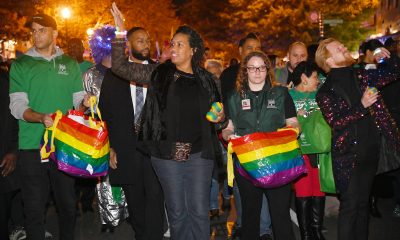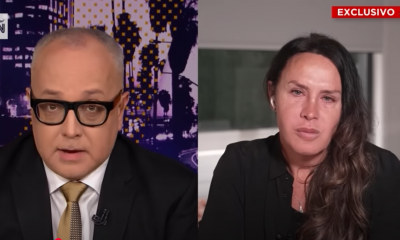National
Activists reflect on Black Trans Lives Matter movement resurgence
Blade speaks with Alex Santiago, Jasmyne Cannick
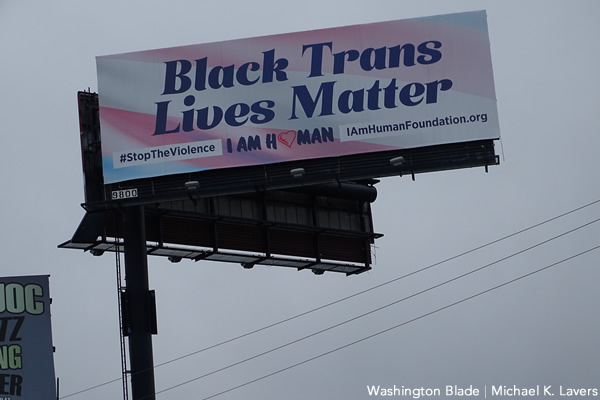
The world came to a standstill last year as a video surfaced online that showed then-Minneapolis police officer Derek Chauvin murdering George Floyd. The video went viral and sparked numerous protests against racism and police brutality in the U.S. and around the world as many people felt it a potent time to relay their frustrations with and to their governments.
For the LGBTQ community, these protests brought to light the need for human rights for transgender individuals as the murders of people like Tony McDade in Florida and Nina Pop in Missouri reawakened the flame within the Black Trans Lives Matter movement.
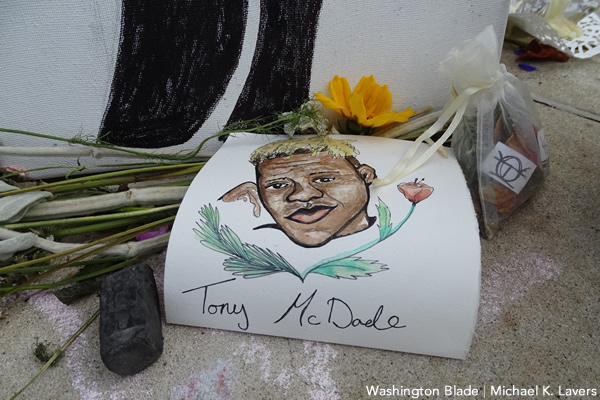
The Washington Blade more than a year later spoke with Alex Santiago, executive director of the I Am Human Foundation in Atlanta, and Jasmyne Cannick, a Democratic political strategist and journalist in Los Angeles, to reflect on last year’s Black Trans Lives Matter movement, how far it has come, and what’s in store for the future.
Uplifting voices often silenced
Participating in the Black Lives Matter protests was an easy decision for Santiago. He is a member of the Legendary House of Garcon, a ballroom house headquartered in D.C.
Although the house is composed mostly of LGBTQ members, Santiago still felt the need to center trans voices and experiences by visually representing them during Black Lives Matter marches.
“[I decided that] when I go I’m going to have signs that say ‘Black Trans Lives Matter.’ After talking to a couple of the people in the house, they said it was a great idea. So, they got these t-shirts made that incorporated the trans colors [baby blue, baby pink and white],” says Santiago.
Out of the 250 people in the Legendary House of Garcon, 175 showed up to D.C. from other states to march in solidarity with Black trans people. Santiago says that from what he was told, his was the largest group of activists representing Black trans lives at protests.
“At first I thought people were going to look at us crazy, like, ‘Why are you separating yourselves or being exclusive?’. But, we got a great response from the general population that was there that day. It was a good day,” says Santiago.
Cannick, who was in Los Angeles during the protests, lent her efforts to platforming pertinent issues. She identifies herself as an ally and a “friend” to the LGBTQ community.
“I’m active in the LA community and everybody knows me. So, whenever something happens, someone is hurt, someone is killed or someone needs to get the word out about something that’s going on particularly as it relates to the trans community, I’m always asked to get involved, and I do,” says Cannick.
Over the past year, she reported on multiple LGBTQ issues including the trial of Ed Buck, a Democratic political fundraiser who was convicted in the deaths of two gay Black men who he injected with methamphetamine in exchange for sex.
What happened to the BTLM movement and what needs to change?
The nature of many social movements is that as the intense emotion surrounding them fades, people’s fervor for change wanes as well. This is especially true with allies who are not directly linked to the cause.
“Fatigue and frustration at the relatively slow pace of change to a growing backlash on the right against efforts to call out systemic racism and white privilege — has led to a decline in white support for the Black Lives Matter movement since last spring, when white support for social justice was at its peak,” US News reports about the Black Lives Matter movement.
Cannick believes this is the same for the Black Trans Lives Matter movement. She says Americans allow the media to dictate how it behaves and responds to issues. Thus, when stories “fall out of our media cycles … they fall out of our memories.”
“I think that’s not going to change, and that’s a psychological thing, until we learn how to not let the media necessarily dictate our issues,” says Cannick.
She suggests that individuals remain plugged into their communities by “doing anything to make sure they keep up with an issue” including following the “right people” on social media and setting up Google alerts for any breaking news.
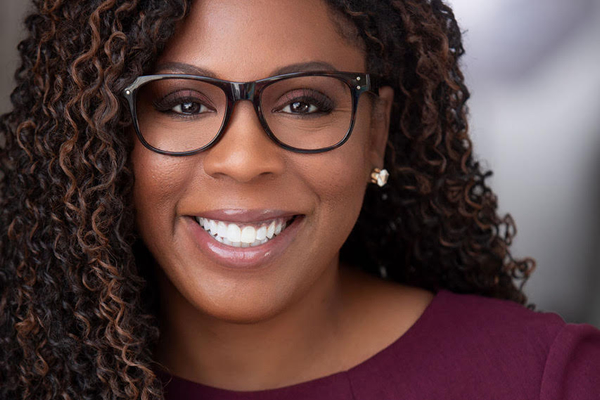
Santiago also echoes Cannick’s sentiments.
“We wait until something happens before we do something. And, I don’t want to be retroactive; I want to be proactive. I want people to see me when things are going well [and when they’re not going well],” says Santiago.
Upon returning to his home in Atlanta after the D.C. protests, Santiago contacted a billboard installation company and paid for a billboard labelled, “Black Trans Lives Matter” to be displayed on University Avenue near downtown Atlanta. He says that the billboards got attention and helped to spread much-needed awareness. Following this success, he is now in the process of installing a new billboard labelled, “Black, Trans and Visible. My life Matters.”
“Unless you’re in people’s faces or something drastic happens, people forget. Unless you’re living it, people forget,” says Santiago.
As time progresses, both Santiago and Cannick nest hope for the Black Trans Lives Matter movement. However, this hope can only persist when crucial steps are taken to ensure Black trans individuals around the country are protected, most importantly through legislation.
The New York Times reports there are close to 1,000 elected LGBTQ officials in the U.S., with at least one in each state except Mississippi.
“We need to have more legislation. We need more voices in power like the council Biden has right now,” says Santiago.
“You know that [Biden] has a lot of trans people and Black trans people [involved], and a part of that’s a positive step in the right direction, but we need that times 10,” says Santiago.
He believes that political representation should extend to local governance where ordinary Black trans individuals can be trained to assume leadership roles.
Cannick’s focus is on the Black community.
“[Trans women] are usually murdered by Black men. If we ever expect that to change, we need to start talking about that,” says Cannick.
She’s open to having conversations that put people, including her as a cis-identifying woman, in uncomfortable and awkward spaces.
She hosts a podcast titled “Str8 No Chaser” and recently aired an episode, “Why Are Black Men Killing Trans Women,” where she discussed with three Black trans women about the gender and sexuality dynamics within the Black community and their perils.
U.S. Supreme Court
Supreme Court to consider bans on trans athletes in school sports
27 states have passed laws limiting participation in athletics programs

The U.S. Supreme Court on Thursday agreed to hear two cases involving transgender youth challenging bans prohibiting them from participating in school sports.
In Little v. Hecox, plaintiffs represented by the ACLU, Legal Voice, and the law firm Cooley are challenging Idaho’s 2020 ban, which requires sex testing to adjudicate questions of an athlete’s eligibility.
The 9th U.S. Circuit Court of Appeals described the process in a 2023 decision halting the policy’s enforcement pending an outcome in the litigation. The “sex dispute verification process, whereby any individual can ‘dispute’ the sex of any female student athlete in the state of Idaho,” the court wrote, would “require her to undergo intrusive medical procedures to verify her sex, including gynecological exams.”
In West Virginia v. B.P.J., Lambda Legal, the ACLU, the ACLU of West Virginia, and Cooley are representing a trans middle school student challenging the Mountain State’s 2021 ban on trans athletes.
The plaintiff was participating in cross country when the law was passed, taking puberty blockers that would have significantly reduced the chances that she could have a physiological advantage over cisgender peers.
“Like any other educational program, school athletic programs should be accessible for everyone regardless of their sex or transgender status,” said Joshua Block, senior counsel for the ACLU’s LGBTQ and HIV Project. “Trans kids play sports for the same reasons their peers do — to learn perseverance, dedication, teamwork, and to simply have fun with their friends,” Block said.
He added, “Categorically excluding kids from school sports just because they are transgender will only make our schools less safe and more hurtful places for all youth. We believe the lower courts were right to block these discriminatory laws, and we will continue to defend the freedom of all kids to play.”
“Our client just wants to play sports with her friends and peers,” said Lambda Legal Senior Counsel Tara Borelli. “Everyone understands the value of participating in team athletics, for fitness, leadership, socialization, and myriad other benefits.”
Borelli continued, “The U.S. Court of Appeals for the Fourth Circuit last April issued a thoughtful and thorough ruling allowing B.P.J. to continue participating in track events. That well-reasoned decision should stand the test of time, and we stand ready to defend it.”
Shortly after taking control of both legislative chambers, Republican members of Congress tried — unsuccessfully — to pass a national ban like those now enforced in 27 states since 2020.
Federal Government
UPenn erases Lia Thomas’s records as part of settlement with White House
University agreed to ban trans women from women’s sports teams

In a settlement with the Trump-Vance administration announced on Tuesday, the University of Pennsylvania will ban transgender athletes from competing and erase swimming records set by transgender former student Lia Thomas.
The U.S. Department of Education’s Office for Civil Rights found the university in violation of Title IX, the federal rights law barring sex based discrimination in educational institutions, by “permitting males to compete in women’s intercollegiate athletics and to occupy women-only intimate facilities.”
The statement issued by University of Pennsylvania President J. Larry Jameson highlighted how the law’s interpretation was changed substantially under President Donald Trump’s second term.
“The Department of Education OCR investigated the participation of one transgender athlete on the women’s swimming team three years ago, during the 2021-2022 swim season,” he wrote. “At that time, Penn was in compliance with NCAA eligibility rules and Title IX as then interpreted.”
Jameson continued, “Penn has always followed — and continues to follow — Title IX and the applicable policy of the NCAA regarding transgender athletes. NCAA eligibility rules changed in February 2025 with Executive Orders 14168 and 14201 and Penn will continue to adhere to these new rules.”
Writing that “we acknowledge that some student-athletes were disadvantaged by these rules” in place while Thomas was allowed to compete, the university president added, “We recognize this and will apologize to those who experienced a competitive disadvantage or experienced anxiety because of the policies in effect at the time.”
“Today’s resolution agreement with UPenn is yet another example of the Trump effect in action,” Education Secretary Linda McMahon said in a statement. “Thanks to the leadership of President Trump, UPenn has agreed both to apologize for its past Title IX violations and to ensure that women’s sports are protected at the university for future generations of female athletes.”
Under former President Joe Biden, the department’s Office of Civil Rights sought to protect against anti-LGBTQ discrimination in education, bringing investigations and enforcement actions in cases where school officials might, for example, require trans students to use restrooms and facilities consistent with their birth sex or fail to respond to peer harassment over their gender identity.
Much of the legal reasoning behind the Biden-Harris administration’s positions extended from the 2020 U.S. Supreme Court case Bostock v. Clayton County, which found that sex-based discrimination includes that which is based on sexual orientation or gender identity under Title VII rules covering employment practices.
The Trump-Vance administration last week put the state of California on notice that its trans athlete policies were, or once were, in violation of Title IX, which comes amid the ongoing battle with Maine over the same issue.
New York
Two teens shot steps from Stonewall Inn after NYC Pride parade
One of the victims remains in critical condition

On Sunday night, following the annual NYC Pride March, two girls were shot in Sheridan Square, feet away from the historic Stonewall Inn.
According to an NYPD report, the two girls, aged 16 and 17, were shot around 10:15 p.m. as Pride festivities began to wind down. The 16-year-old was struck in the head and, according to police sources, is said to be in critical condition, while the 17-year-old was said to be in stable condition.
The Washington Blade confirmed with the NYPD the details from the police reports and learned no arrests had been made as of noon Monday.
The shooting took place in the Greenwich Village neighborhood of Manhattan, mere feet away from the most famous gay bar in the city — if not the world — the Stonewall Inn. Earlier that day, hundreds of thousands of people marched down Christopher Street to celebrate 55 years of LGBTQ people standing up for their rights.
In June 1969, after police raided the Stonewall Inn, members of the LGBTQ community pushed back, sparking what became known as the Stonewall riots. Over the course of two days, LGBTQ New Yorkers protested the discriminatory policing of queer spaces across the city and mobilized to speak out — and throw bottles if need be — at officers attempting to suppress their existence.
The following year, LGBTQ people returned to the Stonewall Inn and marched through the same streets where queer New Yorkers had been arrested, marking the first “Gay Pride March” in history and declaring that LGBTQ people were not going anywhere.
New York State Assemblywoman Deborah Glick, whose district includes Greenwich Village, took to social media to comment on the shooting.
“After decades of peaceful Pride celebrations — this year gun fire and two people shot near the Stonewall Inn is a reminder that gun violence is everywhere,” the lesbian lawmaker said on X. “Guns are a problem despite the NRA BS.”
-

 U.S. Supreme Court1 day ago
U.S. Supreme Court1 day agoSupreme Court to consider bans on trans athletes in school sports
-

 Out & About1 day ago
Out & About1 day agoCelebrate the Fourth of July the gay way!
-

 Maryland4 days ago
Maryland4 days agoSilver Spring holds annual Pride In The Plaza
-

 Opinions4 days ago
Opinions4 days agoSupreme Court decision on opt outs for LGBTQ books in classrooms will likely accelerate censorship

